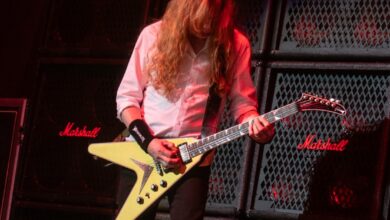Heart’s Awe-Inspiring And Heartfelt Interpretation Of “Stairway To Heaven” Earned Widespread Admiration
Heart’s 2012 rendition of “Stairway to Heaven” at the Kennedy Center Honors didn’t just pay tribute to Led Zeppelin—it redefined what a tribute performance could be. In a night filled with iconic moments, this one stood out as something transcendent. It was a convergence of artistry, reverence, and deep emotional resonance. The setting was grand, the stakes were high, and the result was unforgettable. With the Wilson sisters leading the charge, the performance struck a delicate balance between homage and reinvention.
The song began with a gentle spark: Nancy Wilson, perched on a stool, softly picked the iconic opening notes on her acoustic guitar. It was familiar, yet fresh—her playing carried a calm intensity that immediately captured the audience’s attention. There was silence in the room, the kind of silence that happens when everyone knows they’re about to witness something rare. And then Ann Wilson entered with vocals that were hauntingly soulful, powerful but controlled, slowly lifting the room note by note.
As the song unfolded, it grew in scope and scale. A gospel choir, draped in black, emerged behind them—an unexpected but inspired addition. The voices layered into the arrangement seamlessly, giving the song a spiritual grandeur that had never been explored in the original version. The choir didn’t overwhelm the music; they elevated it, adding a sense of ascension to a song already steeped in mysticism.
And then came the drums—Jason Bonham, son of the late John Bonham, took the stage and sat behind the kit with a quiet focus. When he finally hit that first kick, it was like a thunderclap. The emotional weight of having John Bonham’s son behind the drums was not lost on anyone in the room. He didn’t try to replicate his father’s style exactly—he channeled the energy, the force, the spirit of what John had brought to the original, and did so with astonishing grace.
Robert Plant, seated alongside Jimmy Page and John Paul Jones, watched intently. Throughout the performance, cameras captured Plant’s emotional journey—from stoic observation to visible tears. This was a man who had spent decades distancing himself from the mythology of “Stairway to Heaven,” a song that had shadowed him through his career. Yet here he was, in tears, finally feeling the depth of his own creation through the lens of another band’s interpretation.
The arrangement swelled into its crescendo. The choir rose in volume, Jason’s drums echoed through the hall like cannon fire, and Ann Wilson pushed her voice to its limit with a final soaring note that seemed to pierce straight through time. This wasn’t just a song anymore—it was a resurrection, a revival, a reckoning. Every layer of the performance—strings, brass, percussion, vocals—converged into a majestic finale that shook the audience to their core.
What made it even more profound was the sense of unity. The performers weren’t trying to steal the spotlight from Led Zeppelin—they were shining it back on them. And the band members, once reserved, now beamed with gratitude. Jimmy Page smiled through most of the performance, nodding along in clear approval. John Paul Jones looked quietly proud. And Plant? He mouthed “wow” in disbelief, his eyes glossy with emotion.
In an interview afterward, Plant admitted that he had never fully understood the emotional depth of “Stairway to Heaven” until he saw this performance. Coming from the song’s original vocalist, that was a staggering statement. It proved that music, even decades after its creation, could still reveal new meanings and stir new feelings—especially when passed through the hands of musicians who treat it with both reverence and bravery.
Heart’s performance was not just a cover. It was a reimagining, a celebration, and perhaps most importantly, a bridge between generations. It allowed an audience—many of whom had never seen Led Zeppelin live—to feel the energy of the band’s legacy in real time. It also gave Led Zeppelin themselves a chance to see how far their music had traveled and how deeply it still resonated.
The standing ovation at the end wasn’t just polite applause. It was thunderous, sustained, heartfelt. People stood in awe, some with tears in their eyes, recognizing they had just witnessed one of those rare cultural moments that would live on in stories, videos, and memory. Even the toughest critics of “Stairway to Heaven” covers found themselves silenced. This one was different. This one mattered.
To this day, that Kennedy Center Honors performance is cited as one of the greatest live tributes ever filmed. It has racked up millions of views online and continues to draw new fans into both Heart’s and Led Zeppelin’s music. It’s studied by musicians, shared by fans, and remembered by anyone who saw it as the night a song got its wings all over again.
For Heart, it was a defining moment. They had already carved out their own place in rock history, but this performance placed them in an even higher echelon. It wasn’t just their vocal or instrumental prowess on display—it was their ability to feel, to connect, and to move people. That’s what made the tribute so unforgettable.
And for Led Zeppelin, it served as a kind of full-circle moment. The band that once mystified the world with their layered compositions and cryptic lyrics now sat and watched the next generation unwrap that mystery and show it back to them, refracted through a lens of love and admiration. It was humbling. It was healing.
Long after the curtains closed and the final note faded, the echo of that night still lingers in music halls, YouTube comment sections, and the hearts of fans who felt something shift. Music, at its best, transcends time, ego, and even its own creators. On that night in 2012, “Stairway to Heaven” didn’t just echo—it ascended.





